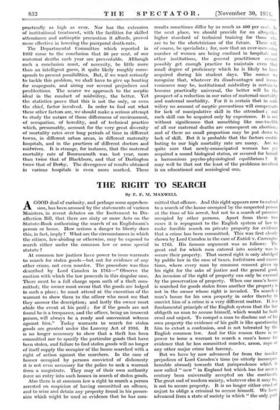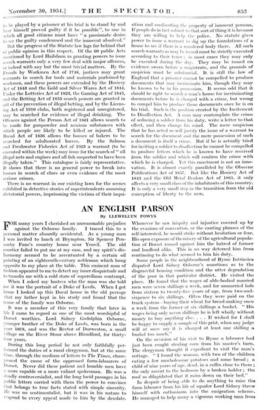THE RIGHT TO SEARCH
By E. F. M. MAXWELL AGOOD deal of curiosity, and perhaps some apprehen- sion, has been aroused by the statements of various Ministers, in recent debates on the Incitement to Dis- affection Bill, that there are sixty or more Acts on the Statute-Book authorizing the search of an Englishman's person or home. How serious a danger to liberty does this, in fact, imply? - What-are the circumstances in which the citizen, law-abiding or otherwise, may be exposed to search either under the common law or some special statute ?
At common law justices have power to issue warrants to search for stolen goods—but not for evidence of any other crime, not even murder. The procedure was thus described by Lord Camden in 1765—" Observe the caution with which the law proceeds in this singular case. There must be a full charge upon oath of a theft com- mitted; the owner must swear that the goods are lodged in such a place ; he must attend at the execution of the warrant to show them to the officer who must see that they answer the description; and lastly the owner must abide the event at his peril ; for if the goods are not found he is a trespasser, and the officer, being an innocent person, will always be a ready and convenient witness against him." Today warrants to search for stolen goods are granted under the Larceny Act of 1916. It is no longer necessary to show that a theft has been committed nor to specify the particular goods that have been stolen, and failure to find stolen goods will no longer of itself supply the occupier of the house searched with a right of action against the searchers. In the case of houses occupied by persons convicted of dishonesty it is not even necessary for the police to seek a warrant from a magistrate. They may of their own authority force an entry into such houses in search of stolen goods.
Also there is at common law a right to search a person arrested on suspicion of having committed an offence, and to seize and detain any property found in his posses- sion which might be used as evidence that he has com- mitted that offence. And this right appears now to extend to a search of the.house occupied by the suspected person at the time of his arrest, but not to a search of premises occupied by other persons. Apart from these two cases it is repugnant to the English system of law to make forcible search on private property for evidence that a crime has been committed. This was first clearly shown by Lord Camden in the case of Enlick v. Carrington in 1765. His famous argument was as follows: The great end for which men entered into society was to - secure their property. That sacred right is only abridged by public law in the case of taxes, forfeitures and execu- tions, where every man by common consent gives up his right for the sake of justice and the general good. An invasion of the right of property can only be excused by the preservation of property. When one man's house is searched for goods stolen from another the property is not in the owner whose right is invaded. To search a man's house for his own property in order thereby to convict him of a crime is a very different matter. It is a fundamental principle of the English system that the law obligeth no man to accuse himself, which would be both cruel and unjust. To compel a man to disclose out of his own property the evidence of his guilt is like questioning him to extort a confession, and is not tolerated by the English conmion law. And for this reason• there is no power to issue a warrant to search a man's house for evidence that he has committed murder, arson, rape or any other major crime but larceny. But we have by now advanced far from the insular prejudices of. Lord Camden's time (so utterly incompre- hensible abroad) towards that jurisprudence which is now called " new " in England but which has for over a century been universally accepted on • the continent. The great end of modern society, whatever else it .may be, is not to secure property. It is no longer either cruel or unjust to oblige a criminal to accuse himself. We have advanced from a state of society in which " the only part to be played by a prisoner at his trial is to stand by and hear himself proved guilty if it be possible", to one in which all good citizens must have " a passionate desire to sec the guilty condemned and the innocent absolved."
But the progress of the Statute law lags far behind that of public opinion in this respect. Of the 60 public Acts mentioned by Lord Hailsham as granting powers to issue search warrants only a very few deal with major offences, or indeed with any but the most trivial matters. By the Frauds by Workmen Act of 1748, justices may grant warrants to search for tools and materials purloined by workmen, and these powers, are extended by the Hosiery Act of 1843 and the Gold and Silver Wares Act of 1844. Under the Lotteries Act of 1823, the Gaming Act of 1845, and the Betting Act of 1853 search powers are granted in aid of the prevention of illegal betting, and by the Licens- ing Act of 1910 Clubs, both registered and unregistered, may be searched for evidence of illegal drinking. The Offences against the Person Act of 1861 allows search to be made for gunpowder and noxious substances with which people are likely to be killed or injured. The Bread Act of 1836 allows the houses of bakers to be searched for adulterated loaves. By the Salmon and Freshwater Fisheries Act of 1923 a warrant (to be executed within the week) may issue for the search of " all illegal nets and engines and all fish suspected to have been illegally taken." This catalogue is fairly representative. It shows that there is no general power to break into houses in search of clues or even evidence of the most serious crimes.
There is no warrant in our existing laws for the scenes exhibited in detective stories of superintendents assuming dictatorial powers, imprisoning the victims of their inqui- sition and confiscating the property of innocent persons. If people do in fact submit to that sort of thing it is because they are willing to help the police. No statute gives power to issue a warrant to dig up the foundations of a house to see if there is a murdered body there. All such search warrants as may be issued must be strictly executed according to their tenor ; in most cases they may only be executed during the day. They may be issued on evidence sworn before a magistrate, and the grounds of suspicion must be substantial. It is still the law of England that a prisoner cannot be compelled to produce documents that may incriminate him, though they may be known to be in his possession. It seems odd that it should be right to search a man's house for incriminating documents before he is charged with a crime, but wrong to compel him to produce those documents once he is on his trial. Such is the position created by the Incitement to Disaffection Act. A man may contemplate the crime of seducing a soldier from his duty, write a letter to that effect, and then change his mind. The mere suspicion that he has acted so will justify the issue of a warrant to search for the document and the mere possession of such a document is itself a crime. But if he is actually tried for inciting a soldier to disaffection he cannot be compelled to produce letters which he is known to have received from the soldier and which will confirm the crime with which he is charged. Yet. this enactment is not an inno- vation. It is almost exactly paralleled by the Obscene Publications Act of 1857. But like the Hosiery Act of 1843 and the Old Metal Dealers Act of 1861, it only affects a very small class of the inhabitants of this country. It is only a very small step in the transition from the old conception of liberty to the new.











































 Previous page
Previous page